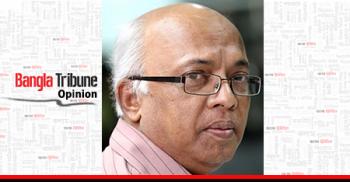 The euphoria generated by the dialogue between the government and the opposition appears to be dissipating somewhat. Despite Prof. AQM Badruddoza Chowdhury’s satisfaction at the talks which he and his Jukto Front team held with Prime Minister Sheikh Hasina and her colleagues on Friday, the reality about the talks between the Awami League-led 14-party Alliance and the Jatiya Oikya Front headed by Dr. Kamal Hossain is quite in the grey region. The talks between Sheikh Hasina and Kamal Hossain and their teams lasted more than three hours, which was quite exhaustive given the chasm which has kept the ruling party and the opposition apart.
The euphoria generated by the dialogue between the government and the opposition appears to be dissipating somewhat. Despite Prof. AQM Badruddoza Chowdhury’s satisfaction at the talks which he and his Jukto Front team held with Prime Minister Sheikh Hasina and her colleagues on Friday, the reality about the talks between the Awami League-led 14-party Alliance and the Jatiya Oikya Front headed by Dr. Kamal Hossain is quite in the grey region. The talks between Sheikh Hasina and Kamal Hossain and their teams lasted more than three hours, which was quite exhaustive given the chasm which has kept the ruling party and the opposition apart.
If the nation was buoyed initially by the talks between the government and the Oikya Front taking place, the enthusiasm was quite dampened by the release on social media of images of the leaders of the front partaking of food and drinks at Ganabhaban. Surprisingly, no similar images of the members of the government team at the talks were released, which quite naturally has raised the question of whether a concerted move was afoot to humiliate the Oikya Front by portraying its leaders as being interested in little more than gormandizing. The release of the images was in bad taste and Mahmudur Rahman Manna did make a good point when he questioned the motive behind it.
Food and drink apart, the Oikya Front did not seem overly happy at the outcome of the negotiations but does look forward to more such interactions with the governing circles in the days ahead. Dr. Kamal Hossain struck a positive note on the talks, diplomatically unwilling to convey anything that might be construed to be of a negative nature. That was the happy part. Intriguingly, though, the BNP, a major component of the opposition alliance, made it known that it was not satisfied with the outcome of the parleys at Ganabhaban. That was a departure from political norms. If Kamal Hossain had already spoken of the outcome of the talks on behalf of the Oikya Front, it should have been for Mirza Fakhrul Islam Alamgir to keep his silence. That did not happen, which raised the question of the discomfort the BNP may already be feeling within the alliance. It can only break out of it at risk to its future, for the truth is that the opposition has, at least for now, cast itself in the image of Kamal Hossain. In a proper sense, when Sheikh Hasina accepted Kamal Hossain’s epistolary request for talks on the forthcoming election, she was responding more to him than to the Oikya Front.
And what has the government’s take on the negotiations been? Obviously, a remarkable degree of civility was demonstrated by the government and the Oikya Front at Thursday’s talks. Within a couple of days, however, the prime minister’s ire was aroused by the Front’s expressed goal of carrying on with its movement to force the government into conceding its demands. Her point was simple: the opposition could not negotiate with the government and yet continue its agitation against it. That raises a fresh question: is the government already resigned to the talks ending up in futility? Against a background of politics being highly polarised, with political leaders of differing camps unwilling to speak to one another, one will not be surprised if the tempo raised by the dialogues fizzles out, perhaps sooner rather than later. It would be naïve to think that the divergence of views between the ruling circles and the opposition will soon lead to a consensus on the issues the country is faced with. Among the Oikya Front’s demands have been the release of BNP Chairperson Begum Khaleda Zia from imprisonment and the deployment of the army at the election. The government has not agreed to either, for a couple of reasons. The first is the BNP chief has been convicted of corruption, a fact which the government says is a matter for the judiciary. And the second is that the Awami League will look upon the demand for an army presence to supervise the situation at the voting centres as a hint of an inability on its part to conduct a credible election. And, of course, the principal demand of the opposition, namely, the constitution of an interim or election-time government, has already been dismissed by Sheikh Hasina and her administration. The government has more than once pointed to the Constitution, which in light of the 15th Amendment blocks any chance of an unelected administration taking over to supervise the election.
It would be naïve to think that the divergence of views between the ruling circles and the opposition will soon lead to a consensus on the issues the country is faced with. Among the Oikya Front’s demands have been the release of BNP Chairperson Begum Khaleda Zia from imprisonment and the deployment of the army at the election. The government has not agreed to either, for a couple of reasons. The first is the BNP chief has been convicted of corruption, a fact which the government says is a matter for the judiciary. And the second is that the Awami League will look upon the demand for an army presence to supervise the situation at the voting centres as a hint of an inability on its part to conduct a credible election. And, of course, the principal demand of the opposition, namely, the constitution of an interim or election-time government, has already been dismissed by Sheikh Hasina and her administration. The government has more than once pointed to the Constitution, which in light of the 15th Amendment blocks any chance of an unelected administration taking over to supervise the election.
The conclusion to be drawn from all of these political realities centres on a crucial point, which is that the form and substance of the talks on Thursday and Friday were but a reflection of the unhealthy adversarial politics that has long defined relations between the Awami League and the parties and groups arrayed against it. The form of the dialogue aroused the interest of the nation’s political quarters. The substance of it was not much in evidence. In the two months or so that remain before the election, therefore, little more than cautious optimism will inform thoughts on politics in the immediate future.
The projected rally of the Jatiya Oikya Front — and it has already asked to be permitted to hold the rally at Suhrawardy Udyan — on Tuesday will be a hint of where the government and the opposition go from here. The prime minister has assured Dr. Kamal Hossain and his team that the Oikya Front is free to hold its rallies anywhere. The rally earmarked for Tuesday will be a test case for the ruling party to demonstrate its readiness to act on that promise.
Syed Badrul Ahsan is the Editor-in-Charge at The Asian Age


